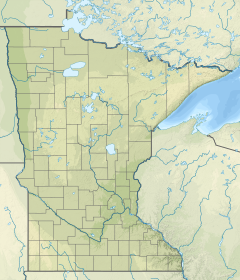The Buffalo River is a 139-mile-long (224 km)[2] tributary of the Red River of the North in western Minnesota in the United States. Via the Red River, Lake Winnipeg and the Nelson River, it is part of the watershed of Hudson Bay. The river drains an area of 1,189 square miles (3,080 km2).[3]
| Buffalo River | |
|---|---|
 The Buffalo River in Buffalo River State Park | |
| Location | |
| Country | United States |
| State | Minnesota |
| Counties | Clay, Becker |
| Physical characteristics | |
| Source | |
| • location | Tamarac Lake |
| • coordinates | 46°55′11″N 95°41′06″W / 46.9196814°N 95.6850401°W |
| Mouth | |
• location | Red River of the North near Georgetown, Minnesota |
• elevation | 853 feet (260 m)[1] |
| Length | 139 miles (224 km) |
| Basin size | 1,189 square miles (3,080 km2) |

Course
editThe Buffalo River flows from Tamarac Lake in the Tamarac National Wildlife Refuge in central Becker County and flows generally westwardly into Clay County, past the towns of Hawley and Georgetown and through Buffalo River State Park. It flows into the Red River about 1 mile (2 km) west of Georgetown.
The river's largest tributary is the 71.8-mile-long (115.6 km)[2] South Branch Buffalo River, which rises in western Otter Tail County and flows initially westward into northern Wilkin County, then northward into Clay County. It joins the main stem of the river near Glyndon, Minnesota.[4]
See also
editReferences
edit- ^ "Geographic Names Information System". U.S. Geological Survey. 1980-01-11. Retrieved 2012-11-22.
- ^ a b "National Hydrography Dataset high-resolution flowline data". U.S. Geological Survey. Archived from the original on 2012-03-29. Retrieved 2011-06-08.
- ^ U.S. Geological Survey Geographic Names Information System: Buffalo River
- ^ "A Management Plan for Buffalo River State Park". Minnesota Department of Natural Resources. 1980.
{{cite journal}}: Cite journal requires|journal=(help)
- Waters, Thomas F. (1977). The Streams and Rivers of Minnesota. Minneapolis: University of Minnesota Press. ISBN 0-8166-0960-8.
